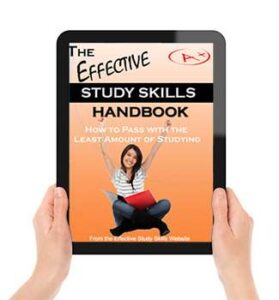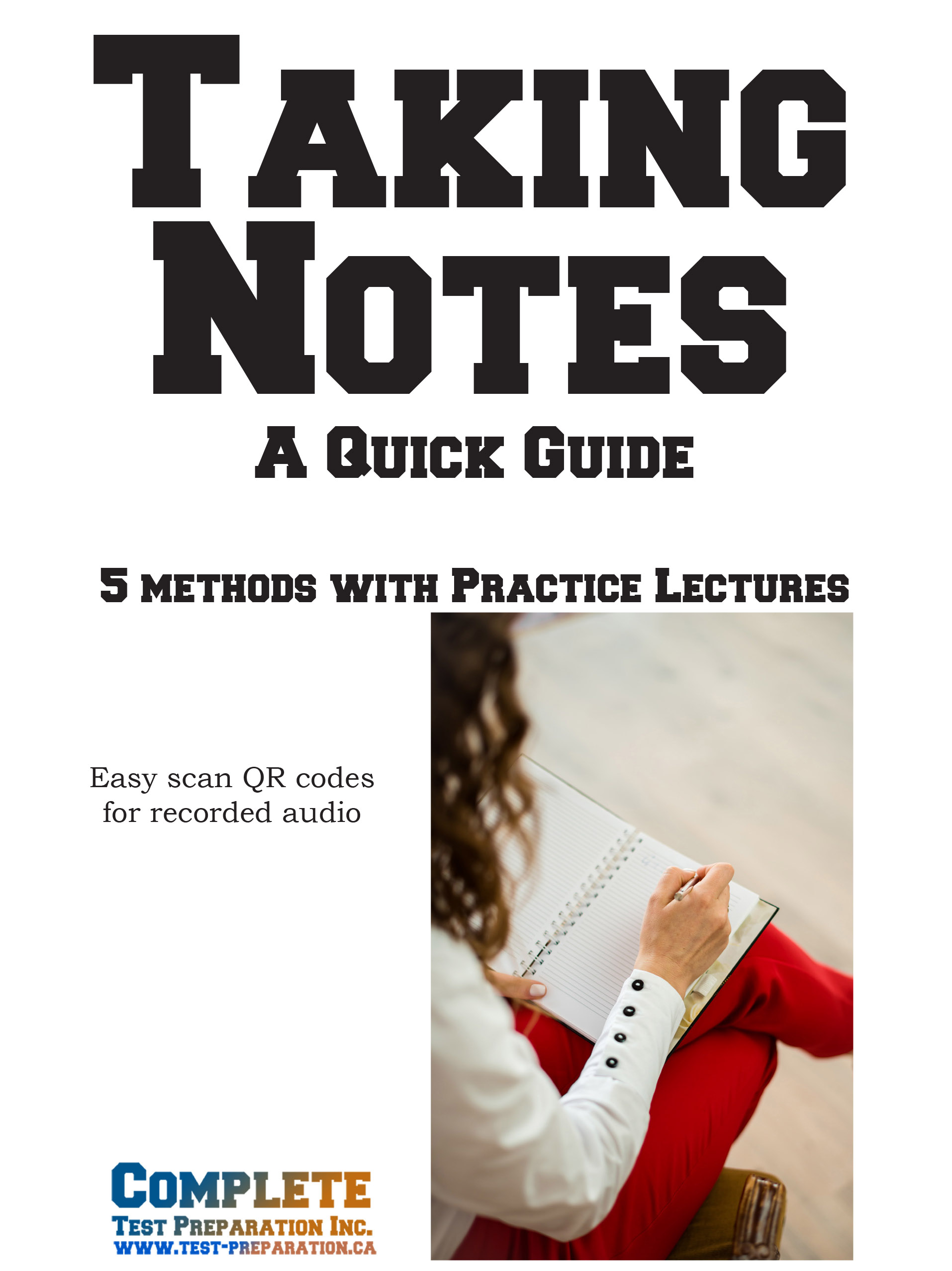7 Steps to Developing Good Study Habits
- Posted by Brian Stocker MA
- Date December 18, 2017
- Comments 1 comment
How to Develop Good Study Skills
Why is it that there are some students who spend every waking hour studying and others who don’t appear to put in as much effort but still get good grades? Is this due to genetics? Are some people just naturally more intelligent than others? Is it IQ?
The truth is that being a successful student has little to do with intelligence but everything to do with knowing how to study. Studying is a skill, and once you have mastered it, you will excel.

Audio Version
Step 1: Change Your Approach to Studying
Studying as something that they have to do instead of something that they want to do. According to research, the manner in which you approach a task is just as important as the task itself. If you want to study smarter instead of harder you need to be in the right frame of mind.
Don’t try and study when you have too many pressing and stressful issues to deal with, you won’t be effective. If you are distracted by family or relationship problems, come back to your studies when you are more focused.
Here are some tips to change your mindset towards studying:
- Think positive and remind yourself of your abilities and skills.
- Don’t compare yourself to other students, you may not be good in every subject but you are good at something and this is what you need to focus on.
- Think about how you can improve instead of beating yourself up about the grades you didn’t get.
- Even if you have left your assignments and studying for your exams until the last minute, your aim should be to get as much done as possible instead of not doing anything at all.
- Do your best in every subject so that no matter what grade you get you can be proud knowing you did as much as you could.
Taking a Test? We can Help!
Step 2: What is Your Intention?
Each time you sit down to study, ask yourself this question, “What is your purpose for studying and what are you aiming for?” If you are distracted and not fully immersed in your work you are wasting your time. Your study habits should be directly correlated to your life goals; if your future depends on how well you do in school, would it make sense to put your best efforts into studying? If you have no motivation to study, you will find it tedious and boring. In order for your studies to mean something to you, you have to put meaning into your studies.
Step 3: What Are Your Study Goals?
To get into a successful daily routine it is important to have study goals and deadlines. Goals and deadlines will motivate you to get the work done. It’s also important that your goals are realistic or you will set yourself up for failure which can be very de-motivating. Here are some questions you should ask yourself to help you to create some goals:
- When is the best time for you to study?
- How long do you need to study?
- Are you happy with the grades you are getting?
- What grades do you want to get?
- Are there any subjects you are struggling with?
- What priorities and personal commitments do you have?
After you have reflected on these questions and answered them accordingly, you will know what areas you need to focus on and what subjects and topics you need to spend more time on. You might realize that there is one subject that you are really struggling with and you feel that you need to hire a private tutor to ensure that you get the grades that you need to pass.
If you find that there are days when you don’t have enough time to study, you might need to cut down on some social activities and spend more time studying.
Step 4: Studying Should Become a Part of Your Daily Routine
If you know that cramming isn’t working for you, then it’s time to try something different and definitely something that is going to cause you less stress. Regardless of whether you have a test or an exam coming up, you need to make time to study every day.
If you want to develop good study habits you need to be consistent in order for it to become a part of your daily routine.
Sometimes, life just happens and you have to cram. Here are some tips on how to cram.
How to make a study plan
Step 5: Time Management
Managing your time well is extremely at school or at well, anything. You need to have enough time to spend on each subject and extra time for the subjects that you find the most difficult. The average amount of time you should spend studying outside the classroom is 15 hours per week. If you have a learning disability you will need to plan for extra time.
If you are going to fulfil your goals as a student, there are some things that you will have to cut out of your life. To develop successful study habits you will need to prioritize your time effectively. For example, if you play sports and practice limits the amount of hours you can spend studying, you are going to have to cut down on some practice sessions. To get the best out of managing your time well as a student, here are some tips:
- What do you do on a daily basis: This might sound obvious, but you will be shocked at how many unnecessary activities are taking away your study time once you write them down. Take a sheet of paper and a pen and write down everything you have to do on a daily basis, this should also include classes, deadlines, shift work and social activities. Your next step should be to create a schedule planner but this will be discussed in step 6.
- Plan: Taking the time out to think, plan and research your work is critical for good time management. Allow extra time so that you can process new information.
- Don’t procrastinate and avoid distraction: Procrastination will hold you back in every area of your life and so it is important that you are focused on what you need to get done and do it. If you are easily distracted by friends, social media and TV, you will need to switch off all modes of communication during your study times.
- Review your schedule: Things are going to change in your life, so you should assess and review your schedule on a regular basis and make changes where necessary. This will ensure that you remain consistent with your daily study routine.
- More on time management
How to avoid procrastination
Taking a Test? We can Help!
Step 6: Create a Schedule Planner
A lack of organization will hinder your progress; you should know exactly what you need to do on a day by day, week by week and month by month basis. There should never be a day when you are not sure of what you are supposed to be doing. A schedule planner is basically a massive calendar that has everything you need to do on it, that includes your study times, assignments, field trips etc. As each day goes by and you have completed each task, you can cross them off.
Remember to keep in mind that there are some assignments that are going to be longer than others, some might last a week, others might take a whole semester to complete. If you don’t schedule time for them on a daily basis you are likely to forget and leave them to the last minute.
Step 7: Create the Right Atmosphere
Mess is not conducive to success. Before you start studying you need to organize your study area. You will not be able to focus if you are surrounded by chaos and clutter, make sure everything is neat and tidy before you open your books. Keep your handouts and notes in separate binders for each subject. You should also have index tabs within those folders to separate different topics.
You should have all tools for study at hand such as textbooks, pens, pencils, notebooks, laptop, thesaurus, dictionary etc. Make sure that you have sufficient lighting, and that there are no distractions and no noise. You will also need to make sure that you are not too comfortable; you don’t want to fall asleep. Turn off all modes of communication and if necessary put a “DO NOT DISTURB” sign on your door so that people know not to come in while you are studying.
Step 8: Get Enough Sleep
There is no point in studying when you are tired, you won’t retain any information. The most sensible thing to do is to make sure that you get 8 hours of sleep each night so that you are well rested and refreshed the next day. Students often speak of staying up all night and cramming, according to research, not only is this detrimental to your health, but it also has a negative effect on your memory. Sleep is important for several reasons; during sleep, the brain sends signals to the body to release compounds and hormones that help to:
- Reduce the risk of health conditions
- Control appetite
- Regulate the immune system
- Retain memory
Scientific studies show that a lack of sleep changes the natural physical makeup of the body and increases the risk of serious illness such as obesity, diabetes, heart disease and even death. The average adult should sleep for seven to eight hours each night. In a study conducted by researchers in Italy and the United Kingdom it was found that people who slept for less than six hours each night increased their chances of premature death by 12 percent. The same research also found that people who slept for less than five hours per night were 1.7 times more likely to die from all causes.
Sleep and Memory
Getting enough sleep not only helps you to focus, it also strengthens and protects your memory. Research has found that sleeping after studying can enhance memory retention. People who have been deprived of sleep experience the following:
- Find it difficult to take in information because the neurons in the brain have been overworked
- Interpret events in the wrong way
- Make bad decisions
- Find it difficult to access previous information
It is important that you get seven to eight hours of sleep each night so that you can experience all stages of sleep. Slow wave sleep and rapid eye movement contribute to the following:
- Memory processing
- Long-term memories
- Procedural memory
- Creative thinking
If you know that you are not getting enough sleep, it is important that you start building good sleeping habits. Here are some tips on how to do so:
- Schedule your sleep: Establish a sleep-wake cycle by going to bed and waking up at the same time every day, and this includes the weekends. It will also help you to get into the habit of a bed time routine such as reading or taking a warm bath.
- Avoid stimulants: Caffeine, nicotine and chocolate keep you awake, alcohol might make you feel tired, but you won’t get a good night’s rest. Don’t consume any stimulants at least four hours before you go to bed.
- Make your bed comfortable: Invest in a comfortable mattress such as a memory foam mattress. They conform to your body shape which provides extra support and comfort. Use earplugs to keep out any sounds that can disrupt your sleep and use room darkening shades to help you fall asleep easier.
- Sleep apps: There are several sleep apps that will help you to sleep better. They keep track of your sleep cycles and provide a progressive alarm clock to prevent the shock of waking up suddenly which can increase tiredness.
If you start to feel tired while you are studying take a power nap. Research has discovered that a 30 to 60 minute nap enhances your ability to make good decisions. It also helps you to memorize information. A 60 to 90 minute nap plays an important role in building new connections in the brain and problem solving.
If you are feeling tired it is advised that you take a nap instead of having a cup of coffee. Studies have found that caffeine decreases memory performance. Even though you might feel more energetic, it can make you more vulnerable to making mistakes. As with everything in life there is a strategy to napping, here are some tips:
- If you are going to take naps during your study time be consistent. Napping is most effective in the afternoon between the hours of 1pm and 3pm.
- Don’t take a nap for longer than 90 minutes or you will wake up more tired than when you went to sleep.
- Take a nap in the dark or cover your eyes. You will fall asleep faster if you block out the light.
- Cover yourself with a blanket because your body temperature drops while you are sleeping.
Take Away
Lying in bed and reading a few notes here and there is not going to get you the grades you want. You are going to have to make a conscious and determined effort to study in a way that will maximize your potential and ultimately lead to your success. Before you start working on study skills, start with the above steps, they will prepare your mind for the next stage. Before I go I would like to leave you with a few tips to get the most out of your study time:
- Don’t eat a heavy meal before you start studying, it will make you sleepy and you will find it difficult to focus. Instead, you should eat frequent small meals.
- Before you sit down to study, take a short walk, stretch or do some type of physical exercise, it will prepare your mind for the information you are about to retain.
- Instead of trying to memorize important information such as assignment due dates, write each one of them down as you receive them. We live in a very busy world where we are constantly bombarded with distractions and unless you are very organized it’s easy to forget.
- Prioritize your tasks by color coding your study notes, or you can use different labels.
- Before and after a study session, quickly go over your notes before you move on to a new topic. It is also a good idea to review your notes before going to bed, this will help you to better retain the information you have read.
What Students Say – Study Skills and Test Prep
How to Study

… without endless hours of cramming
… without the need for tutoring
… and without sacrificing the things that matter to you!
Multiple Choice Secrets!

How to Take Notes
Learn 5 Note Taking Methods – With Full Explanation and Examples!
Taking notes is an essential academic skill and you will be doing a LOT!
Learn More and Start Practicing
Date Published: Monday, December 18th, 2017
Date Modified: Tuesday, May 21st, 2024
You may also like
Memory Palace Technique with Examples
The Memory Palace Technique creates stories with familiar places and objects which are associated with certain information. Let me explain the process, let’s us an example to help simplify. We are going to memorize the number five hundred twenty two. …
How not to Get Distracted while Studying
Just eliminate all distractions! Well, unfortunately it’s not that easy for me. I will fiddle with my pen, doodle in the textbook, get lost in thought looking out the window, or make up a song while tapping on my desk. …
Super foods for studying
Imagine taking a test and then hearing a loud “CRUNCH,” just to see the student in front of you biting into raw broccoli Or you look over and see someone eating walnuts while marking off their exam. You wonder, “What …


1 Comment
Good points really impressed, this would definitely help students to study. Thanks for sharing